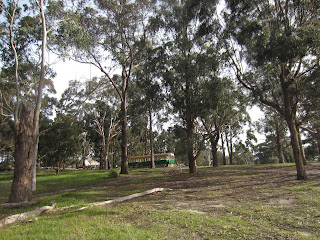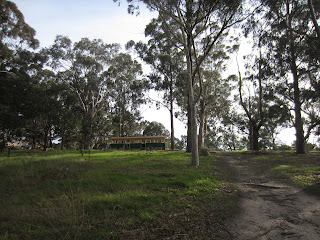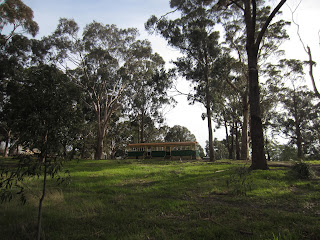At the theatre to see the second part of Angels in America, I was unable to ignore the two women sitting behind me. One of them spent the time before the play, plus both the intervals, detailing to her friend her observations - which one would have to describe as bordering on forensic (or obsessive) - about the deterioration in pothole filling procedures in the streets around her home. The gist, if you're interested, is that procedures are much more slapdash now than twenty years ago when she first moved there - and meanwhile the rates have gone through the roof, (wouldn't you know it?)
Anyway, I was amused as I was filing out at the end to see the two of them still sitting there, looking livid. They'd evidently squeezed the pothole issue dry, but eventually one of them roused herself to speak.
'I must say, I did not like all that religious stuff', she said to her companion. This struck me as a bit unreasonable: surely one might expect something of the sort - some reference to the spiritual although not necessarily the actual appearance of winged deities - from a play that has 'angels' in its name.
'No', her companion replied, with equal fury, 'and I definitely did not appreciate being blessed.'
I can't imagine ever objecting to being blessed, but I came to religion of my own free will whereas those two, perhaps, had it forced on them. In any case, Angels in America is not really about religion - or rather it is but it's also about so many things that it's hard to say what it's about exactly. If you want to read my muddled attempt to make sense of it, I've written more on the subject here.
Wednesday, 31 July 2013
Tuesday, 30 July 2013
Scone With the Wind
There is a book by Barry Humphries called Neglected Poems. It contains no real poems but a lot of epically vulgar comic verse, which I find amusing but others regard as merely offensive. In amongst the ridiculous doggerel there are also several attempts at something nobler. These fail as poems just as much as the more ribald stuff does, because they too are infected with Humphries's fear of ever being serious.
One example is Wattle Park Blues, in which Humphries looks back at his childhood outings to Wattle Park in outer Melbourne. As so often in Humphries's writing there is a really strong sense of genuine nostalgia in the poem, but, because he insists on making fun of the things he used to - and seems still to - love, hiding to some extent behind the Everidge persona (not that she is mentioned in the poem, but the use of the word 'kiddies', for example is very Edna-esque), Wattle Park Blues, although it does paint a vivid picture, ends up just being jarringly sentimental:
Wattle Park Blues
Back in the wattled thirties
Before the world went dark,
They built this noble chalet
On the crest of Wattle Park.
The trammies on their days off
Came for Devonshire teas,
And outside the kiddies seesawed
With mercurochromy knees.
A graveyard for old cable trams
Lay below us in the valley,
Where we played till creamy soda time
And dixies in the chalet.
How we envied the conductor
On the tram on which we'd come.
With his cubes of coloured tickets,
Nippled rubber on his thumb.
Loved his uniform of navy serge,
Scarlet piping on lapel;
Wished we could say, Move down the car,
And tug that leather bell.
Above us in the giant gums
Were bird houses built on high,
Little chalets for the maggies,
Tudor surburbs in the sky.
We grew older, came less often,
To watch the wattles burst here,
Though Geoff, Jeanette and Alison
Each had their twenty-firsts here;
But we'd outgrown creamy sodas,
Were spottier - and thirstier.
We drank Pimms and puffed on Garricks,
Hugged gardenia'd girlfriends hard,
As we parked our mothers' cars by night
Along the Boulevard,
And Wattle Park was quite forgotten
And the trams' metallic rumble.
Dear to the heart of childhood,
Like the taste of Violet Crumble.
And so dear friends and strangers
I presume to be your guide
To the terminus of memory
I have shouted you a ride.
To the place where me and Colin
And a thousand kiddies more
Picnicked underneath the pollen
In the days before the War.
Today the trees seem sparser
The old cable trams have gone,
But they still serve in the chalet
Melbourne's finest buttered scone.
Mind you, despite my gripes about the poem, finding myself with nothing to do one afternoon in Melbourne, I was unable to resist the twin attractions of wattle and scones, and so I boarded the No. 70 tram outside Flinders Street station and headed out to Humphries's former haunt.
It was rather lovely. There were trams lurking among the trees:
There was a clock set in stone:
There was a child of the Gallipoli Lone Pine:
Humphries's chalet was still there:
Promisingly, it advertised itself as a tea room:
Alas it was no such thing - it is only available now for 'events':
Sconeless, I wandered off in search of solace in the form of wattle:
Which I soon found:
Along with evidence either of illiteracy in the Victorian Department of Parks, or, if we're being charitable, of a one-man crusade to reinstate an earlier usage (presuming 'remenant' is an earlier usage for 'remnant'):
But pedantry is banished in the face of wattle, surely:
I had the place pretty much to myself:
My sense was that it was somewhere that was less visited than it had been, populated more by ghosts than people. This impression was reinforced by the fact that the former stables were now used by departmental workers as a tea room:
and final resting place for aged park benches:
Meanwhile, the Wattle Park cottage has become the headquarters for the basket makers of Victoria, which is ludicrous enough that it might amuse Humphries:
I came upon a stone edged pond with a decaying Italianate fountain. It looked like the kind of place where once people took tea. Now it is neglected and abandoned:
A last blaze of wattle led me to the park exit:
Why do we no longer put such care into the design and building of municipal structures:
I suppose it's a question of economics, but why have we reached a point where we prefer cheap to good?
One example is Wattle Park Blues, in which Humphries looks back at his childhood outings to Wattle Park in outer Melbourne. As so often in Humphries's writing there is a really strong sense of genuine nostalgia in the poem, but, because he insists on making fun of the things he used to - and seems still to - love, hiding to some extent behind the Everidge persona (not that she is mentioned in the poem, but the use of the word 'kiddies', for example is very Edna-esque), Wattle Park Blues, although it does paint a vivid picture, ends up just being jarringly sentimental:
Wattle Park Blues
Back in the wattled thirties
Before the world went dark,
They built this noble chalet
On the crest of Wattle Park.
The trammies on their days off
Came for Devonshire teas,
And outside the kiddies seesawed
With mercurochromy knees.
A graveyard for old cable trams
Lay below us in the valley,
Where we played till creamy soda time
And dixies in the chalet.
How we envied the conductor
On the tram on which we'd come.
With his cubes of coloured tickets,
Nippled rubber on his thumb.
Loved his uniform of navy serge,
Scarlet piping on lapel;
Wished we could say, Move down the car,
And tug that leather bell.
Above us in the giant gums
Were bird houses built on high,
Little chalets for the maggies,
Tudor surburbs in the sky.
We grew older, came less often,
To watch the wattles burst here,
Though Geoff, Jeanette and Alison
Each had their twenty-firsts here;
But we'd outgrown creamy sodas,
Were spottier - and thirstier.
We drank Pimms and puffed on Garricks,
Hugged gardenia'd girlfriends hard,
As we parked our mothers' cars by night
Along the Boulevard,
And Wattle Park was quite forgotten
And the trams' metallic rumble.
Dear to the heart of childhood,
Like the taste of Violet Crumble.
And so dear friends and strangers
I presume to be your guide
To the terminus of memory
I have shouted you a ride.
To the place where me and Colin
And a thousand kiddies more
Picnicked underneath the pollen
In the days before the War.
Today the trees seem sparser
The old cable trams have gone,
But they still serve in the chalet
Melbourne's finest buttered scone.
Mind you, despite my gripes about the poem, finding myself with nothing to do one afternoon in Melbourne, I was unable to resist the twin attractions of wattle and scones, and so I boarded the No. 70 tram outside Flinders Street station and headed out to Humphries's former haunt.
It was rather lovely. There were trams lurking among the trees:
There was a clock set in stone:
There was a child of the Gallipoli Lone Pine:
Humphries's chalet was still there:
Promisingly, it advertised itself as a tea room:
Alas it was no such thing - it is only available now for 'events':
Sconeless, I wandered off in search of solace in the form of wattle:
Which I soon found:
Along with evidence either of illiteracy in the Victorian Department of Parks, or, if we're being charitable, of a one-man crusade to reinstate an earlier usage (presuming 'remenant' is an earlier usage for 'remnant'):
I had the place pretty much to myself:
My sense was that it was somewhere that was less visited than it had been, populated more by ghosts than people. This impression was reinforced by the fact that the former stables were now used by departmental workers as a tea room:
and final resting place for aged park benches:
Meanwhile, the Wattle Park cottage has become the headquarters for the basket makers of Victoria, which is ludicrous enough that it might amuse Humphries:
I came upon a stone edged pond with a decaying Italianate fountain. It looked like the kind of place where once people took tea. Now it is neglected and abandoned:
A last blaze of wattle led me to the park exit:
Why do we no longer put such care into the design and building of municipal structures:
Friday, 26 July 2013
Wednesday, 24 July 2013
Once Was Ordinary
My husband's watching a TV programme where the word 'cassette' has just been uttered. 'It's funny', he says, 'cassettes were just part of everyday life once, but now they're not, and it's only now, hearing the word out of the blue, that I suddenly notice what an odd word it is. Where did it come from?'
'Well', I say, 'it comes from the French, of course, Old North French, to be exact - the word for box, "casse". That's what a degree in modern languages is for.'
Actually, I say no such thing. I just quickly look it up on the internet, which is where I discover that the word was formed in 1969, from Old North French, to label the new invention that was the little plastic thing containing audio tape.
Which only goes to show that there really is no reason to bother with a degree in modern languages - unless you want to experience the quiet private satisfaction of knowing that you've read Eugene Onegin in the original, and it really never will be as good when read in translation; not to mention the rather special kind of abstruse smugness that comes from opening Clive James's new translation of Dante and thinking, 'That bit about a "keening sound" where did that come from? I'm sure it's not in Dante's text' and then checking and finding that, sure enough, it isn't there and your memory really isn't as bad as you'd imagined.
Such pathetic and fleeting moments of pleasure won't earn you a living, of course, but for me they justify the years spent poring over dictionaries and grammar books. Many - the majority even - may not agree. Each to their own, I guess - or as we modern language types like to say, 'One man's meat is another man's poisson' ,(pathetic, I know, and it doesn't even make sense - I know, I really do know).
'Well', I say, 'it comes from the French, of course, Old North French, to be exact - the word for box, "casse". That's what a degree in modern languages is for.'
Actually, I say no such thing. I just quickly look it up on the internet, which is where I discover that the word was formed in 1969, from Old North French, to label the new invention that was the little plastic thing containing audio tape.
Which only goes to show that there really is no reason to bother with a degree in modern languages - unless you want to experience the quiet private satisfaction of knowing that you've read Eugene Onegin in the original, and it really never will be as good when read in translation; not to mention the rather special kind of abstruse smugness that comes from opening Clive James's new translation of Dante and thinking, 'That bit about a "keening sound" where did that come from? I'm sure it's not in Dante's text' and then checking and finding that, sure enough, it isn't there and your memory really isn't as bad as you'd imagined.
Such pathetic and fleeting moments of pleasure won't earn you a living, of course, but for me they justify the years spent poring over dictionaries and grammar books. Many - the majority even - may not agree. Each to their own, I guess - or as we modern language types like to say, 'One man's meat is another man's poisson' ,(pathetic, I know, and it doesn't even make sense - I know, I really do know).
Tuesday, 23 July 2013
Wayne's World
I woke this morning to hear the announcer on the radio say, 'The Royal baby, Wayne', and I thought, 'Oh, good on them, they're going with what they like and not being snobbish or bound by stuffy tradition.
Then I realised that what she'd said was, 'The Royal baby, weighing ...'
Oh well. One day, maybe. In the meantime, I guess it's 'Welcome to the world, George/James/Henry/John'
(Within this limited set of offerings, I hope it's John, because that was my father's name - and yes, I do realise I'm not supposed to be interested in the whole affair, but anyone anywhere having a healthy baby is an occasion for rejoicing, and the baby's parents look to me as though they are without a mean bone in their bodies so what harm is there in being happy for them?)
Then I realised that what she'd said was, 'The Royal baby, weighing ...'
Oh well. One day, maybe. In the meantime, I guess it's 'Welcome to the world, George/James/Henry/John'
(Within this limited set of offerings, I hope it's John, because that was my father's name - and yes, I do realise I'm not supposed to be interested in the whole affair, but anyone anywhere having a healthy baby is an occasion for rejoicing, and the baby's parents look to me as though they are without a mean bone in their bodies so what harm is there in being happy for them?)
Sunday, 21 July 2013
Taking Their Time
At the cinema this afternoon I couldn't help noticing that one of the sponsors for the Russian Film Festival now showing round Australia, Mosfilm, appears not to have noticed that it is no longer operating in the Soviet Union:
When I came home I checked to see whether Aeroflot had yet removed the hammer and sickle from its logo. It hasn't either. Is it just laziness or does something more sinister lie behind the continuing attachment to the symbols of the Soviet Union in modern day Russia? I find it creepy, I have to say.
Friday, 19 July 2013
A Fine Point
Hand-sewing has become a marginal activity in recent decades, which is why I usually keep quiet about my fondness for it. Marginal activities can easily be mistaken for subversive activities, and I don't want trouble.
All I actually want is an excuse to watch television. I love television but I was brought up to believe that the 'goggle box' is 'mindrotting'. Unable to give it up completely, my solution to having my mind rotted was to reach a compromise: watching television would not rot my mind - or would at least rot it less effectively - I decided, provided I did something constructive at the same time.
In stepped hand-sewing - or, more particularly, patchworking. And, by patchworking, I mean, of course, not buying brand new bits of material and using a sewing machine but stitching together bedspreads out of the worn scraps of your old clothes.
As a result then of my depraved passion for second-rate television I have spent many hours of my life sewing rags together by hand. Among the several not entirely useful things I've made in the process there is a patchwork I made from the clothes I wore before my children were born:
and another put together from the clothes they wore when they were little:
and another I'm still finishing, made from my husband's office shirts (once their collars have worn out rather than while he still needs them):
Thus have I squared with my conscience the many hours of my life lost to Lewis and Thirty Something and The Killing and Eternal Law (was I the only person in the world to like that - I thought Samuel West and the actor who played the devil were especially good) and Damages and The Lakes and Foyle's War.
In the process I have also learnt the true meaning of the phrase 'a bad workman blames his tools', which is not, as I'd first thought that people who do really bad work should accept responsibility, rather than saying, 'I didn't have a good hammer'. Instead, I think what the phrase actually means is that it is only after the years of experience and hours of practice that eventually transform you into a good - or at least reasonably okay - workman that you finally recognise the difference between bad tools and good tools.
Thus it took me an eternity to discover that there is only one brand of needle worth using and that brand is John James (prince among needlemakers, as someone somewhere claims). John James Needles are sold only through the most discriminating outlets - I found mine originally in a shop hidden away off Oxford Street in London - and once you have tried them, you will never be happy with any other variety of needle again.
It is because John James needles are so good that I haven't needed to buy a new packet of them for several years now. The other day I finally ordered some though, and I was pleased, when they arrived, to find that they were still as good as ever. However, when I looked on the back of the packet, I did feel a pang of disappointment - not to mention anxiety:
What is to become of us when we aren't capable of manufacturing even the tiniest things ourselves, in our own countries? Surely, we can't just offload our entire capacity for making things to the populations of Asia? Apart from anything else, how on earth are we - particularly the majority of us who are not daft enough to fill up their spare hours sewing old clothes together into new patterns - going to spend all our newfound spare time?
All I actually want is an excuse to watch television. I love television but I was brought up to believe that the 'goggle box' is 'mindrotting'. Unable to give it up completely, my solution to having my mind rotted was to reach a compromise: watching television would not rot my mind - or would at least rot it less effectively - I decided, provided I did something constructive at the same time.
In stepped hand-sewing - or, more particularly, patchworking. And, by patchworking, I mean, of course, not buying brand new bits of material and using a sewing machine but stitching together bedspreads out of the worn scraps of your old clothes.
As a result then of my depraved passion for second-rate television I have spent many hours of my life sewing rags together by hand. Among the several not entirely useful things I've made in the process there is a patchwork I made from the clothes I wore before my children were born:
and another put together from the clothes they wore when they were little:
and another I'm still finishing, made from my husband's office shirts (once their collars have worn out rather than while he still needs them):
Thus have I squared with my conscience the many hours of my life lost to Lewis and Thirty Something and The Killing and Eternal Law (was I the only person in the world to like that - I thought Samuel West and the actor who played the devil were especially good) and Damages and The Lakes and Foyle's War.
In the process I have also learnt the true meaning of the phrase 'a bad workman blames his tools', which is not, as I'd first thought that people who do really bad work should accept responsibility, rather than saying, 'I didn't have a good hammer'. Instead, I think what the phrase actually means is that it is only after the years of experience and hours of practice that eventually transform you into a good - or at least reasonably okay - workman that you finally recognise the difference between bad tools and good tools.
Thus it took me an eternity to discover that there is only one brand of needle worth using and that brand is John James (prince among needlemakers, as someone somewhere claims). John James Needles are sold only through the most discriminating outlets - I found mine originally in a shop hidden away off Oxford Street in London - and once you have tried them, you will never be happy with any other variety of needle again.
It is because John James needles are so good that I haven't needed to buy a new packet of them for several years now. The other day I finally ordered some though, and I was pleased, when they arrived, to find that they were still as good as ever. However, when I looked on the back of the packet, I did feel a pang of disappointment - not to mention anxiety:
 |
| Exhibit A: packet bought some years ago |
 |
| Exhibit B: Packet bought last week |
Subscribe to:
Comments (Atom)



















































